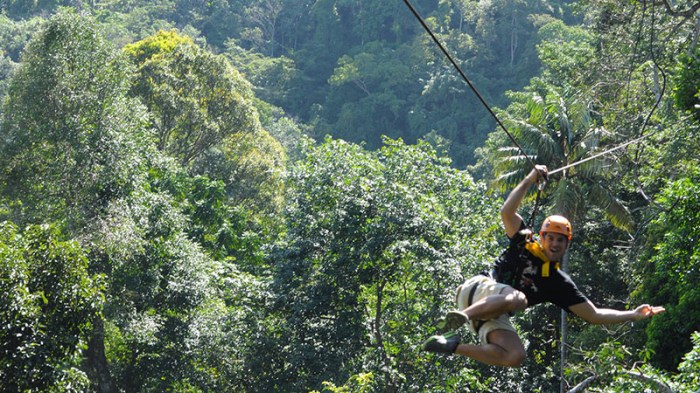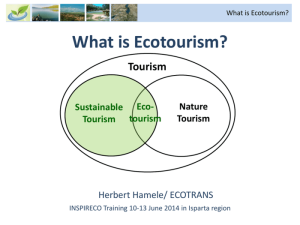
Adventure Ecotourism Experiences sets the stage for this enthralling narrative, offering readers a glimpse into a story that is rich in detail with casual formal language style and brimming with originality from the outset.
Embark on a journey where adventure meets conservation, as we delve into the world of Adventure Ecotourism Experiences.
Introduction to Adventure Ecotourism Experiences
Adventure Ecotourism is a form of travel that combines thrilling outdoor activities with a focus on environmental sustainability and conservation. This type of tourism aims to provide travelers with exciting adventures while promoting responsible travel practices and supporting local communities.
Significance of Adventure Ecotourism
Adventure Ecotourism plays a crucial role in raising awareness about environmental issues and fostering a deeper appreciation for the natural world. By engaging in activities like hiking, kayaking, or wildlife spotting in ecologically sensitive areas, travelers can develop a stronger connection to nature and gain a better understanding of the importance of preserving our planet’s biodiversity.
- Adventure ecotourism helps protect fragile ecosystems by promoting conservation efforts and sustainable practices.
- It creates opportunities for local communities to benefit from tourism revenue while preserving their cultural heritage.
- Travelers can learn about different ecosystems and wildlife species, contributing to their education and personal growth.
Benefits of Adventure Ecotourism
Adventure Ecotourism offers numerous benefits for both travelers and the environment. By participating in eco-friendly adventures, individuals can reduce their carbon footprint and support conservation initiatives. Additionally, these experiences often provide a more authentic and enriching travel experience compared to traditional tourism activities.
“Adventure Ecotourism allows travelers to explore the natural world in a way that minimizes negative impacts on the environment, making it a sustainable and rewarding travel option.”
- Travelers can engage in exciting outdoor activities while contributing to conservation efforts and environmental protection.
- Local communities benefit from eco-tourism initiatives through the creation of jobs, income opportunities, and cultural exchange.
- Adventure Ecotourism helps promote a greater understanding of the interconnectedness between humans and nature, fostering a sense of responsibility towards environmental stewardship.
Types of Adventure Ecotourism Activities
Adventure ecotourism activities offer a unique way to explore and experience the natural world while promoting conservation and sustainability. By participating in these activities, travelers can immerse themselves in the beauty of nature while also contributing to its preservation.
Hiking
Hiking is a popular adventure activity in ecotourism, allowing travelers to explore natural landscapes on foot. Hiking trails can lead through forests, mountains, or coastal areas, providing opportunities to observe wildlife and enjoy scenic views. It is essential to stay on designated trails to minimize impact on the environment and practice Leave No Trace principles.
Kayaking
Kayaking is another exciting ecotourism activity that allows travelers to navigate waterways while observing wildlife and enjoying the tranquility of nature. Paddling through rivers, lakes, or coastal areas provides a unique perspective and the opportunity to see marine life up close. It is crucial to follow guidelines for responsible kayaking to protect fragile ecosystems.
Wildlife Safaris
Wildlife safaris are a popular ecotourism activity, offering travelers the chance to observe animals in their natural habitats. Whether on land in national parks or underwater in marine reserves, wildlife safaris provide unforgettable encounters with diverse species. It is important to choose ethical operators that prioritize animal welfare and conservation efforts.
Importance of Sustainable Practices
Sustainable practices are essential in adventure ecotourism activities to minimize negative impacts on the environment and local communities. By following principles of sustainability, such as reducing waste, supporting local conservation projects, and respecting wildlife, travelers can ensure that their adventures contribute to the preservation of natural resources for future generations.
Destinations for Adventure Ecotourism

Adventure ecotourism is a growing trend, and there are several destinations around the world that offer unique experiences blending adventure with conservation. These destinations not only provide thrilling activities but also focus on sustainability and supporting local communities.
Costa Rica
Costa Rica is a well-known destination for adventure ecotourism, offering activities such as zip-lining through rainforests, surfing in the Pacific Ocean, and exploring diverse wildlife in national parks. The country is a leader in sustainable tourism practices, with many eco-friendly accommodations and tour operators. Local communities benefit from ecotourism through job opportunities, cultural exchange, and preservation of natural resources.
New Zealand
New Zealand is another popular destination for adventure ecotourism, known for its stunning landscapes and outdoor activities. Visitors can enjoy hiking in the Southern Alps, bungee jumping in Queenstown, or kayaking in the pristine fjords. The country places a strong emphasis on conservation and responsible tourism, ensuring that the environment is protected for future generations. Local communities benefit from ecotourism by showcasing their traditions, crafts, and cuisine to visitors.
Kenya
Kenya offers a unique combination of adventure and wildlife experiences, with activities such as safari tours, hot air balloon rides over the Maasai Mara, and hiking in the Great Rift Valley. Ecotourism plays a crucial role in supporting conservation efforts and local communities in Kenya. By promoting wildlife protection and sustainable practices, ecotourism helps generate income for rural populations and preserves the country’s natural heritage.
Planning an Adventure Ecotourism Trip
Adventure ecotourism trips offer a unique opportunity to explore nature while promoting conservation efforts. To ensure a successful and responsible adventure ecotourism experience, proper planning is essential. Here is a step-by-step guide on how to plan an adventure ecotourism trip:
Researching and Choosing Responsible Tour Operators
When planning an adventure ecotourism trip, it is crucial to research and choose responsible tour operators. Look for operators that prioritize sustainability, support local communities, and have a strong commitment to environmental conservation. Consider reading reviews, checking certifications, and asking about their conservation efforts before making a decision.
Tips on Packing Essentials for an Adventure Ecotourism Journey
Packing for an adventure ecotourism journey requires careful consideration to ensure you are prepared for the unique challenges of exploring nature. Here are some tips on packing essentials for your adventure ecotourism trip:
- Appropriate clothing: Pack lightweight, moisture-wicking clothing that is suitable for the climate and activities you will be participating in.
- Footwear: Bring sturdy and comfortable shoes that provide good support for hiking and walking on uneven terrain.
- Outdoor gear: Include essentials such as a backpack, water bottle, sunscreen, insect repellent, and a first aid kit.
- Sustainable products: Opt for eco-friendly products such as reusable water bottles, biodegradable toiletries, and organic snacks to minimize your environmental impact.
- Camera and binoculars: Capture the beauty of nature and wildlife with a camera and binoculars to enhance your experience.
Ecotourism Principles and Practices

Ecotourism is guided by core principles that aim to minimize negative impacts on the environment, promote conservation efforts, and support local communities. These principles are crucial in ensuring that adventure ecotourism experiences are sustainable and beneficial to both nature and people.
Role of Ecotourism in Promoting Conservation and Sustainable Development
- Ecotourism encourages responsible travel practices that prioritize the protection of natural habitats and wildlife.
- By raising awareness about environmental issues, ecotourism fosters a deeper appreciation for nature and the need for conservation efforts.
- Local communities often benefit from ecotourism through economic opportunities, job creation, and the preservation of their cultural heritage.
- Sustainable development is promoted through ecotourism initiatives that prioritize long-term environmental, social, and economic benefits.
Case Studies of Positive Impacts of Ecotourism
- In Costa Rica, ecotourism has contributed to the protection of rainforests and biodiversity through the establishment of national parks and reserves that attract visitors interested in nature-based activities.
- The Galapagos Islands have implemented strict ecotourism regulations to safeguard the unique flora and fauna of the region while providing sustainable livelihoods for local communities.
- In Kenya, community-based ecotourism initiatives have empowered indigenous tribes to preserve their traditional lands and wildlife habitats while offering visitors authentic cultural experiences.
- The Great Barrier Reef in Australia has benefited from ecotourism practices that emphasize responsible diving and snorkeling tours, along with research and conservation efforts to protect this marine ecosystem.
Immerse yourself in the wonders of nature while making a positive impact through Adventure Ecotourism Experiences, a blend of excitement and environmental consciousness.
FAQs
What are the benefits of Adventure Ecotourism for travelers and the environment?
Adventure Ecotourism offers travelers unique experiences while promoting environmental conservation and supporting local communities.
How can I ensure I choose a responsible tour operator for an Adventure Ecotourism trip?
Research tour operators that prioritize sustainable practices, support local initiatives, and engage in eco-friendly activities.
Which popular destinations around the world are known for offering Adventure Ecotourism experiences?
Destinations like Costa Rica, Iceland, and Kenya are renowned for their diverse Adventure Ecotourism opportunities.





